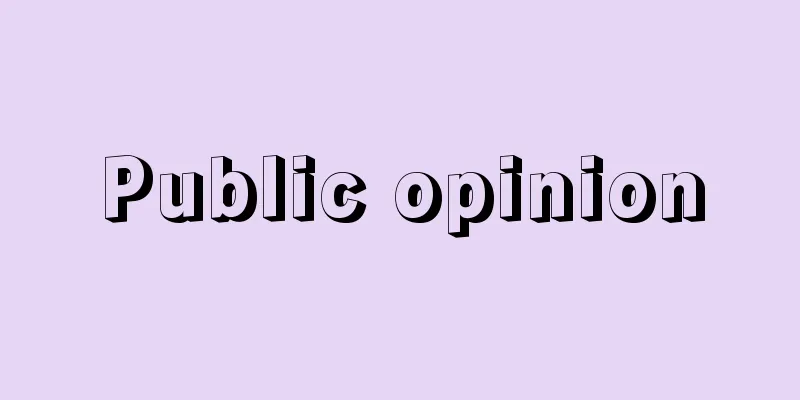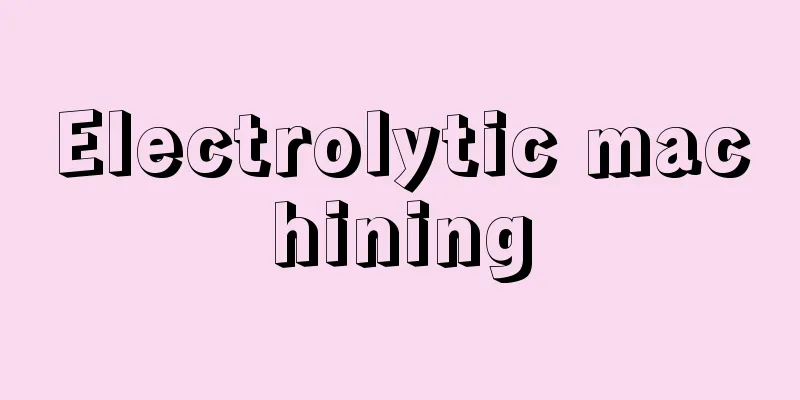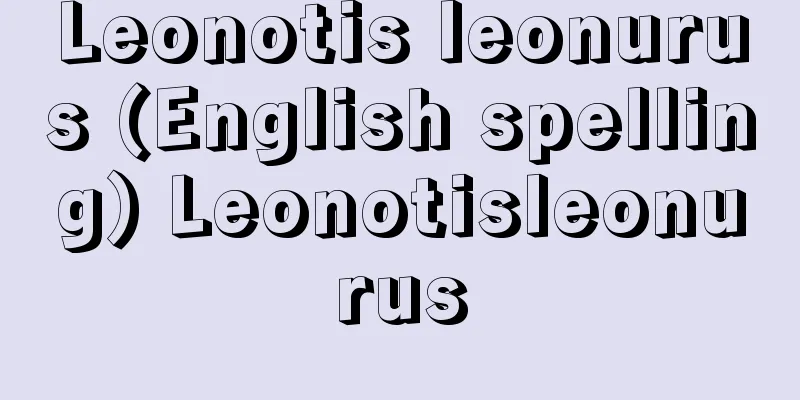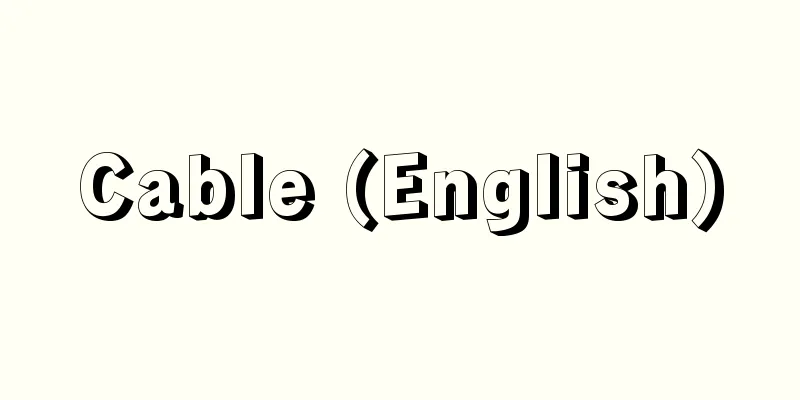Public opinion

|
The majority of people read "public opinion" as "seron," but the original word or character is "yoron," which is read as "yoron." Just as there are many debates over this reading, there are also many debates about what public opinion is, and there is no clear definition. Kinder, D. (1998) states that "public opinion is the diverse opinions that arise regarding subjects related to the exercise of public power, and the quality of these opinions can vary," but this is an insufficient definition. Kenichi Ikeda (2010) adds, "Opinions are called public opinion when they are publicly known (made public), are directed at public issues that affect the interests of many people, and are the subject of political debate over the formation of a majority among opposing opinions." Specifically, these include opinions on issues such as for or against policies or social issues, opinions directed at the government, such as support for the cabinet, and opinions expressed through political participation such as voting. The reason why public opinion, which is such a form of expression, can be the subject of psychology is because public opinion exists in people's minds as a psychological representation, people act based on that cognition, and public opinion is formed through people's communication and interaction. Public opinion also forms part of the dynamics that connect psychology and society, known as the "micro-macro link," in that the micro-psychological phenomenon of people's emotional movements accumulates throughout society, resulting in a change in public opinion, that is, in the macro-level change in society. [Public Opinion Perception and Formation] Public opinion as a psychological representation has two aspects: an individual's pro or con on a certain issue, for example, and a recognition of the overall trend in society (sociotropic recognition, i.e., recognition of which opinion, A or B, is the majority and which has the most momentum) of the general public's distribution of different positions on the issue. Based on this recognition of trends, individuals then determine their own opinion (position on the issue) based on social discussions and knowledge related to the issue. In this dynamic process, the question is often how individuals obtain new information. This is why the role of mass media and the Internet as a medium for transmitting information is attracting attention. Themes such as the agenda-setting effect, priming effect, and framing effect, which are the subject of research on the effects of mass media, demonstrate that the way in which mass media acts to mediate information affects citizens' information acquisition and judgment, which in turn creates the influence of mass media. The Internet has also dramatically increased the possibility for citizens to act as issue publics (participate in politics) by promoting or opposing public opinion in a two-way manner through the interactive exchange of information. Issue publics are directly involved in micro-macro processes through their political participation, and although this existed before the Internet, the medium of the Internet has dramatically increased this ability. Noelle-Neumann, E.'s public opinion research, which looked at this micro-macro process from a macro perspective, separated public opinion into a conflicting and fluid phase in which a majority is being formed, and a phase in which a definitive majority has been formed and views are more or less fixed. She argues that in the former fluid phase, a spiral of silence process is at work in the formation of the majority. In other words, there is pressure to conform to the formation of the majority, and while it is easier for the majority to assert their opinions, it becomes more difficult for the minority to voice their opinions. As this process repeats, the minority is gradually forced into silence. When this fluid phase ends and a fixed phase is reached, public opinion acquires normative power. In other words, it is established as the "correct opinion" in society. [The issue of the quality of public opinion] In public opinion research, the quality of public opinion as a psychological representation is one of the important issues. The term "stupid masses," which is often used in the world, symbolizes the view that citizens lack knowledge and judgment regarding public opinion. From a psychological perspective, this can be seen as an issue of citizens' knowledge and sophistication regarding public opinion. Since a huge amount of information processing ability is sometimes required to learn in detail about the issues that are the subject of public opinion, much research has been done on how citizens who do not have sufficient such ability and lack the time to do so can become knowledgeable (insightful) citizens. Conversely, if the burden on citizens' information processing ability is light, there will be a shortcut to becoming knowledgeable citizens. The first shortcut is to use ideological thinking as a heuristic. As typified by conservative and liberal, ideology is the systematic positioning of various issues based on specific political values, and supporters of a certain ideology can use it as a heuristic to more easily determine which position they should take across many issues. For example, traditionally, once one has decided on one's ideology, one can easily choose whether to support position A or B regarding the Japan-US Security Treaty. However, because it is a heuristic, there are cases in which it can be wrong or inappropriate to apply. For example, environmental issues cannot necessarily be systematized within the conservative-liberal ideology. The second shortcut is to take advantage of the information processing capabilities of others. Many social network studies of political behavior have shown that others around them provide citizens with meaningful information. In other words, citizens are more likely to accept information from other citizens who are more knowledgeable than themselves, which reduces the burden of having to obtain and examine new information from the mass media and other sources. In fact, the importance of the everyday conversation process of citizens in the dynamics of public opinion has been widely demonstrated. The expansion of research and practice of deliberative politics, which seeks to encourage citizens to debate among themselves on a wider scale, is related to this second path. Public opinion survey: Public opinion surveys to know public opinion have been established in many democracies. It is a method of obtaining a representative sample of citizens through a statistically based random sampling method, and then conducting a questionnaire survey to find out the current state of public opinion for this sample. There are several forms, such as interview surveys, telephone surveys, and Internet surveys, and each has its own advantages and disadvantages. In the modern world, public opinion surveys are frequently conducted, and citizens have come to understand the state of sociotropic public opinion by knowing the results of public opinion surveys reported in the mass media, rather than by their own intuitive feelings. Nowadays, public opinion is almost synonymous with public opinion surveys. However, surveys do not distinguish citizens by their amount of knowledge (which is not correct in a normative sense), and it is also known that differences in questioning methods lead to differences in the distribution of responses, so from the perspective of those conducting public opinion surveys, the question is how to conduct a survey that reduces these problems. Many countermeasures have been attempted, such as providing knowledge or allowing discussion before asking opinions, and examining changes in opinions between multiple surveys in which the same questions are asked continuously over a long period of time. → Conformity → Mass Media [Kenichi Ikeda] Latest Sources Psychology Encyclopedia Latest Psychology Encyclopedia About Information |
|
「世論」を「せろん」と読むのが多数派となっているが,語・文字の本来は「輿論」で「よろん」と読む。この読み方を巡って多くの議論があるように世論とは何かという議論も多様であり,確たる定義はない。キンダーKinder,D.(1998)は「世論とは公権力の行使にかかわる対象を巡って多様に生じる意見であり,しかもその意見の質はさまざまでありうる」とするが,これでは定義不足である。池田謙一(2010)はそれに加えて「その意見は公的に知られ(公然化し),多くの人の利害にかかわる公共的publicな問題を対象としており,そして対立する意見の間で多数派形成を巡って政治的な議論の対象となるときに,世論とよぶ」としている。具体的には政策や社会的問題の賛否など争点に対する意見,内閣支持など政権を対象とする意見,投票など政治参加による意見表明などが挙げられる。 こうした表現形態である世論が心理学の対象でありうるのは,世論が心理的な表象として人びとの脳裏に存在し,その認知に基づいて人びとが行動し,さらに人びとのコミュニケーションと相互作用の中で世論形成が進むからである。また世論は人びとの心の動きというミクロな心理現象が社会全体に集積して世論の変容という結果をもたらす,つまりマクロなレベルの社会が変化するという結果をもたらす点で,心理と社会を結ぶ「ミクロ-マクロ・リンク」とよばれるダイナミックスの一部を形成している。 【世論の認識と世論形成】 心理的な表象としての世論は,社会的争点を例に取れば,ある争点について個人の賛否という側面と,その争点に関する異なる立場に対して一般の市民がどのような分布状態にあるかという社会全体の動向認識(ソシオトロピックsociotropicな認識という。意見AとBのどちらが多数派でどちらに勢いがあるかなどの認識)という二つの側面を有する。そして個人はこの動向認識を踏まえつつ,争点に関連した社会的な議論や知識に基づき,自らの意見(争点上の立場)を確定していく。このダイナミックな過程では,しばしば個人がどのように新しい情報を取得するかが問題となる。そこに情報伝達の媒体としてのマスメディアやインターネットの役割が注目される理由がある。マスメディアの効果研究の対象である議題設定効果,プライミング効果,フレーミング効果といったテーマはマスメディアが情報を媒介するときの作用のあり方によって,市民の情報取得・判断が左右され,そのことでマスメディアの影響が生じることを実証している。またインターネットは,市民が情報を双方向的にやりとりしつつ,ある立場の世論を推進したり反対する争点公衆issue publicとして活動する(政治参加する)可能性を飛躍的に高めた。争点公衆はその政治参加によってミクロ-マクロ過程に直接関与し,それはインターネット以前から存在したが,その能力をインターネットという媒体が飛躍的に高めたのである。 このミクロ-マクロ過程をマクロな視点からとらえたノエル・ノイマンNoelle-Neumann,E.の世論研究は,世論を対立的で流動的な多数派形成途上の位相と,決定的な多数派が形成されてほぼ見解が固定した位相を分離して論じた。そして前者の流動的な位相では,多数派の形成において沈黙の螺旋spiral of silence過程が働くと主張する。つまり多数派形成への同調圧力が働き,多数派が意見を主張しやすい一方で,少数派はその意見を口に出しにくくなる。この過程が循環すると少数派はしだいに沈黙を強いられることになる。こうした流動的な位相が終了し,固定的な位相に達すると,世論は規範的な力を獲得する。つまり社会的に「正しい意見」として確立される。 【世論の質の問題】 世論研究では心理的表象としての世論の質が重要な問題の一つである。世上しばしば語られる「愚かな大衆」という語は,市民が世論について知識と判断力を欠いているという見方を象徴している。このことは心理学の視点からは,市民の世論についての知識と洗練度の問題としてとらえられる。そして世論の対象となる争点を詳しく知るにはときに膨大な情報処理能力が必要であることから,そうした能力が十全でなく,そのための時間も欠く市民が,いかにして知識(見識)ある市民たりうるかが,多く検討されてきた。逆にいえば,市民の情報処理能力の負荷が軽ければ知識ある市民への近道が開けるということでもある。 その第1の近道は,ヒューリスティックとしてのイデオロギー的思考の利用である。保守とリベラルに代表されるように,特定の政治的な価値から体系的に諸種の争点を位置づけるのがイデオロギーであり,あるイデオロギーの支持者は多くの争点にわたって自分がどの立場を取るべきなのか,イデオロギーをヒューリスティックとして用いることで判断しやすくなる。たとえば伝統的には日米安全保障条約に対する立場は,イデオロギーが決まれば立場A,Bのいずれを支持すべきかが容易に選択できる。もっともヒューリスティックであるために間違ったり適用が不適切というケースも考えられる。たとえば環境問題が保革イデオロギーで体系づけられるとは限らない。 第2の近道は,他者の情報処理能力を利用することである。政治行動のソーシャル・ネットワーク研究の多くは,周囲の他者が有意義な情報を市民に与えることを示してきた。つまり市民は自分より知識の豊富なほかの市民から情報を受容する傾向が高く,そのことによって自分がマスメディアなどから新規に情報を取得し検討する負担を軽減される。実際,世論の動態の中で,市民の日常的な会話のプロセスの重要性が広く実証されてきている。また,市民同士でより広い範囲で議論させようとする熟議政治deliberation politicsの研究と実践が広がっているのは,この第2の道にかかわっている。 【世論調査public opinion survey】 世論を知るための世論調査は多くの民主主義国で定着している。それは,統計学に則ったランダムサンプリング手法を通じて市民の代表性あるサンプルを取得し,この対象サンプルに対して世論の現状を知るための質問紙調査を行なう手法である。面接調査,電話調査,インターネット調査など複数の形態があり,そのそれぞれに一長一短がある。現代世界では世論調査が頻繁に実施され,市民は自分の直感的な感覚ではなく,マスメディアなどで報道される世論調査の結果を知ることによってソシオトロピックな世論の状態の認識を得るようになった。今では世論といえば世論調査を指すがごとくである。しかしながら,調査は知識量で市民を区別するわけでなく(それは規範的な意味で正しくない),また質問方法の違いが回答の分布に差異をもたらすことも知られており,世論調査実施側から見れば,いかにしてこうした問題点を軽減した調査を実施しうるかが問われている。知識を与えたり議論させてから意見を尋ねる,長期に継続して同じ質問をする複数調査間で意見の変化を検討する,など幾多の対策が試みられている。 →同調 →マスメディア 〔池田 謙一〕 出典 最新 心理学事典最新 心理学事典について 情報 |
Recommend
Factorization
When a polynomial is equal to the product of two ...
"Study on the structure of the Ainu language" - Research on the structure of the Ainu language
…A full-scale dictionary is the Ainu-Russian Dict...
Recurrent Nova - Recurrent Nova
⇒Recurrent nova Source: About Shogakukan Digital D...
Keiichiro Saori
1870 * - 1943 A stage actor from the Meiji to ear...
Makabe
The former town area in the southern part of Sakur...
Polypharmacy
... Myanmar has a national examination system for...
Pack carburizing
...Steel made by carburizing is called case-harde...
Jean Lurçat
French painter and tapestry artist. Born in Bruyè...
Coleshill
…The use of corridors in residential buildings wa...
Wutitz, E.
…On the other hand, Max Dessoir (1867-1947) empha...
Kita Horie
…In 1698 (Genroku 11), the Edo Shogunate ordered ...
Unità - L'Unità (English spelling)
Former organ of the Italian Communist Party (PCI)...
implement
…However, the word “tool” is too narrow to meet t...
MSA (Congo)
...The enthusiastic support for the "Fratern...
Cartaphilus - Cartaphilus
…Christ then replied, “Wait for me to come,” and ...









